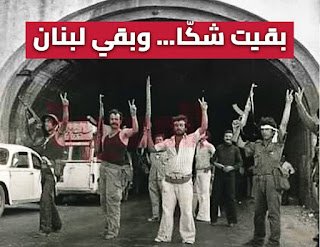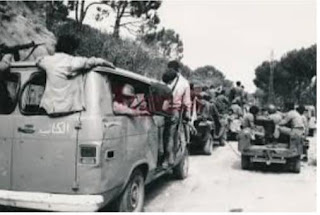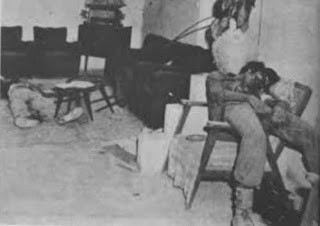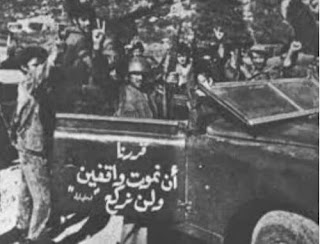The testimony of a resister... in Chekka was their end
Because we faced it valiantly in defense of Lebanon, and because we insist on building the state and that the past not be repeated, we recall from the memory of time the events we experienced, so that they may serve as a lesson for those who consider it.
Yes, it is the memory of a lesson, not a provocation, the memory of a fleeting meeting with the heroes who made the glory of Lebanon and who deserve to return to them through the pages of time. The anniversary to honor those who were a barricade with their bodies so that they would die, and Lebanon would live.
July of the year 1976 passed, very heavy for northern Lebanon, it passed sad, mixed with the blood of the resistance martyrs, stories of steadfastness, and the unyielding will of the people. There, in Chekka Batrounia, the greatest epics were written with the blood of heroes, coloring its blue sea and lofty houses. It is the calm before the storm, not even before the massacre, as the security situation was fairly stable a while ago on that front, but the Palestinian organizations and the Arab Lebanese Army began preparing for the major confrontation, from the outskirts of the towns of the Koura district, in response to the battle of “Tal al-Zaatar.” and “Al-Basha Bridge”. Aim all aim, snap on ups.
At the beginning of the Lebanese war, many bet on the concept of resistance, which, in their view, did not go beyond what looked like “antaries” that could not be spent except within a narrow framework, between friends or in the street and the neighborhood. The invaders themselves, at first, underestimated the resistance of the real Earthlings. For them, all this was just battles that they waged in the face of a civil group, unable to withstand the advancing hordes, greedy for the history of their ancestors. The resounding slap came when the “Lebanese Resistance” proved that its battles are constant, in defense of truth and existence, so it preserved the geography and changed a lot in history, and this is precisely what happened in the Chekka massacres.
At dawn on July 5, 1976, the zero hour struck. Huge forces of Palestinian and clan organizations and pro-Syrian parties, estimated at thousands, moved through the hills of Kafr Hazir, Anfah Plain, Ras Nahash, and Hamat to the Chekka Tunnel, while another Palestinian group undertook the landing operations on Al-Hari Beach. Thus, in less than two hours, Shikka became surrounded on all four sides, and its people woke up from thousands of shells and the impact of the criminal invasion, while only dozens of Lebanese resistance fighters were undertaking its defense.
Church bells rang in Bsharri, Zgharta, and the villages of Batroun district. I knocked without stopping. The whole north is boiling, “our people in Chekka are being slaughtered by the ISIS of that time, and the people of the city with their youth and old age and with their individual light weapons are standing up to the mercenary tanks that are defiling the land…Come to the resistance.”
Cesar Abi Badra, son of the town of Chekka, was there. After 47 years, he recalls the prominent stations of those fateful battles. “The numbers of the resistance fighters were very few compared to the aggressors and mercenaries, and the equipment we had was very light. They besieged Chekka from all sides, and the wounded who falls with us soon becomes a martyr because it is impossible to transfer him to nearby hospitals, due to the siege,” Abi Badra tells the “Lebanese Forces” website.
“The defensive lines began to collapse successively due to the disproportionate numbers of the resistance fighters with the occupiers. The Krenker fell at the Ma’mal al-Turabah point towards the sea, and Chekka al-Atika was attacked by tanks and anti-aircraft guns from the top of Sayyida Kfarhazir, while we were facing heavy ammunition with guns. We then moved to the Al-Ahrar Center on the sea to help the youth in resisting them. The attack was so strong that they managed to enter the heart of Chekka. The Don Carlos Center fell, and other strategic points also fell,” recounts Abi Badra, who indicates that he passed his house and asked his brother and cousin to stay with the children and women, but he met on his return from the Al-Ahrar Center a friend who told him that his cousin Pierre had been wounded. In unequal battles, his condition is critical. Caesar tried hard to save him, but the heroic fighter soon died, a martyr. “Many of the resistance martyrs fell, as did innocent people, women, children and the elderly, in the massacres committed by the Palestinians and those who helped them. Imagine that they lined up a seven-year-old child on the public road, and shot him in the head, and when his mother tried to confront them, they killed her as well.”
Just as the Battle of Chekka Tunnel was pivotal, so was the battle in the Balat area, where Caesar went with a group of relatives and comrades to protect the neighborhood. There, very strong battles broke out, and the sons of Chekka, despite their small number, prevented the aggressors from entering the neighborhood. “It is true that the axes collapsed successively, but the resistance continued because our faith was great in our right to our land. We were defending with all honesty and sincerity our homes, our people, and our towns, and in the end, Chekka won, and it was their end.”
… Aid and supplies started arriving from the north, Jbeil and Beirut. At the Chekka Tunnel, the scene was terrifying. Bodies on the ground of martyrs who were killed either inside their cars or on the road, by shooting or slaughtering. Infants, young women, elderly and old people, the last chapters of their lives could have been more comfortable and calm. All of them passed into the arms of Jesus after their elimination.
However, despite the horror of the massacres, the blood and the pain, the Lebanese refused to submit and obey. On the eve of the seventh of July, the city of Chekka was completely liberated, and on the twelfth of it, history recorded the last chapter of the story of the Battle of Chekka... There, on that Batroun beach, where only the resistance fighters dared.















0 Comments